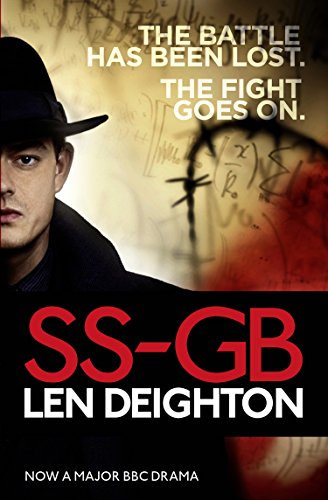
In the literature of alternate history, Nazi Germany often wins World War II. Philip K. Dick’s The Man in the High Castle, Fatherland by Robert Harris, and Jo Walton’s Farthing Trilogy (Farthing, Ha’penny, and Half a Crown, all reviewed here) are prominent examples. There are many others, of which the one I’ve read most recently is SS-GB by the British thriller writer Len Deighton.
A favorite theme in alternate history
It’s November 1941. World War II ended in Europe on February 19 when Great Britain surrendered to Nazi Germany. A puppet Prime Minister has replaced Winston Churchill, who is imprisoned in Germany. King George VI is being held in the Tower of London. Jews have been rounded up and sent “to the notorious concentration camp at Wenlock Edge.” A curfew is in effect in London. Rationing is severe throughout the occupied zone. Thousands of British soldiers are being held in POW camps or in forced labor camps on the Continent. Everywhere, there are “signs of battle damage unrepaired from the street fighting of the previous winter. Shell craters, and heaped rubble, were marked only by yellow tapes, soiled and drooping between roughly made stakes.”
SS-GB by Len Deighton ★★★★☆
At Scotland Yard, Detective Superintendent Douglas Archer reports to SS General Fritz Kellerman, “whose police powers extended over the whole country.” The Superintendent is “Archer of the Yard,” “the Sherlock Holmes of the 1940s.” He’s the country’s most famous detective because of his success in closing several high-profile murder cases. Archer and “the other half of the murder team,” Sergeant Harry Woods, are investigating a mysterious murder when they receive word that an SS Colonel is coming from Germany under express orders from Reichsfürer Heinrich Himmler to take over the case.
Archer will now report to the new man, Dr. Oskar Huth. Huth lives up to the reputation of the SS for arrogance and ruthlessness. As the story advances, the murder case becomes fraught with connections to high-level intrigue. Archer, Huth, and Kellerman warily circle around each other in a high-stakes game that puts all their careers—and their lives—at risk.
Resistance is widespread
Meanwhile, Resistance to the German occupation is growing. As one woman remarks to Archer, “‘In the towns it’s just bombs and murdering German soldiers. In the country districts there are bigger groups, who ambush German motorized patrols . . . ‘” But Resistance is underway at a much higher level: senior British officials in the puppet government are plotting to release the King from the Tower and spirit him off to the United States, where he can lead an eventual effort to bring the Nazis to account. Archer discovers that his seemingly straightforward murder investigation is closely related to this plot—and he becomes deeply involved in the dangerous action that follows.
Not only did Deighton live through World War II as a teenager—he was born in 1929—he thoroughly researched this topic. SS-GB is alternate history of the first rank.
About the author
Len Deighton is often ranked with John le Carre and Ian Fleming in the pantheon of spy novelists. His most familiar books include The Ipcress File, Funeral in Berlin, and the Samson series (Berlin Game, Mexico Set, London Match, and subsequent novels). At this writing, he is 88 years old.
For related reading
I’ve reviewed three other books by Len Deighton:
- Berlin Game – Bernard Samson #1 (A classic novel of Cold War espionage reminiscent of John le Carré)
- Mexico Set – Bernard Samson #2 (In Len Deighton’s classic spy series, Bernard Samson goes to Mexico)
- Bomber (An intensive look a single RAF Bomber Command mission in World War II)
This is one of the 10 best alternate history novels.
My posts 10 top nonfiction books about World War II and The 10 best novels about World War II may also interest you.
If you enjoy reading history in fictional form, check out 20 most enlightening historical novels. And if you’re looking for exciting historical novels, check out Top 10 historical mysteries and thrillers.
For more good reading, check out:
- These novels won both Hugo and Nebula Awards
- The ultimate guide to the all-time best science fiction novels
- 10 top science fiction novels
- The top 10 dystopian novels
- Ten new science fiction authors worth reading now
And you can always find my most popular reviews, and the most recent ones, on the Home Page..




























I love Len Deighton and didn’t know about this book – thank you again.Mal! (The only thing I don’t love about your blog is I find myself immediately poorer from book purchases after every visit!)
Well, far be if from me to advocate poverty. But, after all, you’re all the richer having all those books.